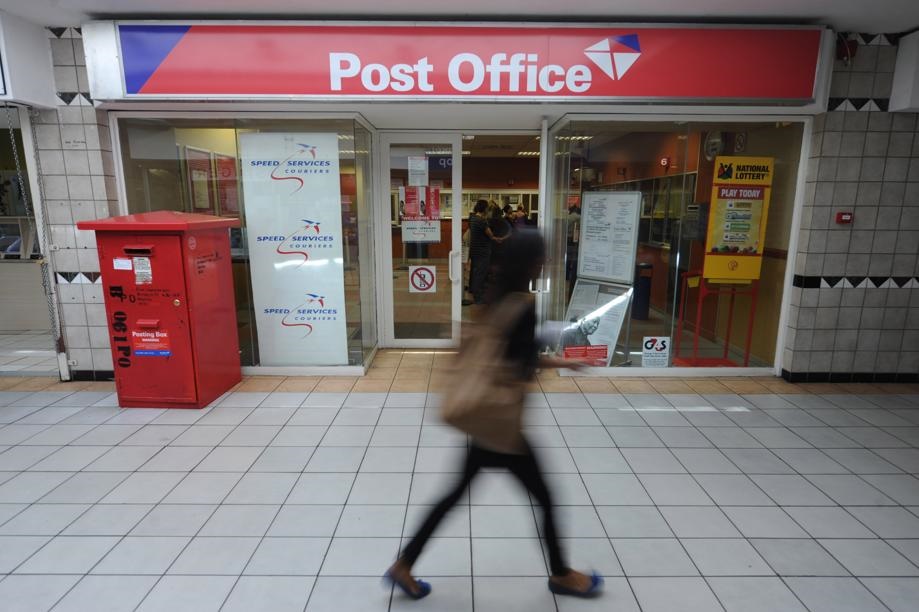
With the entity running at a loss and bleeding millions in delivery fees, along with allegations of mismanagement, money for beneficiaries hangs in the balance
The SA Post Office is losing at least R60 million a month from distributing social grants to millions of citizens, who rely on government’s welfare net for survival.
The situation is so dire that the Post Office is considering shutting down many cash paypoints around the country.
The high cost drivers for this loss are cash-in-transit and security fees, which the Post Office has to pay to ensure that hard cash is delivered effectively to its cash paypoints.
Post Office insiders have estimated that for every R100 the entity gained from the deal to distribute grants on behalf of the SA Social Security Agency (Sassa), it was spending R500.
COSTS HAVE DOUBLED
City Press has obtained the Post Office income statement for 2019, ending in December.
The income statement shows that security costs have more than doubled since the Post Office took over social grant payments from Cash Paymaster Services in April 2018.
While the cash-strapped Post Office is struggling to find new revenue streams to stay afloat, its nine-member board, which began its work on November 1 last year – after being appointed by the Cabinet in October – was paid more than R1 million in fees in December.
The Post Office board said the payments were justified because the board members had been involved in a number of necessary committee meetings and oversight visits.
The income statement reveals that “security costs increased by R355 million to R600 million, from R265 million, due to the increased costs for Sassa payments”.
An internal memorandum, dated December 30 2019, was submitted to the board, briefing members on the Post Office’s status.
In it, group chief information officer Refilwe Kekana warned: “The Post Office finds itself in a financial and operational situation that requires an urgent and focused turnaround strategy that must be implemented by April 1 2020. To date, the previous board and management have not focused on revenue-generating initiatives that would take the Post Office into its new vision and beyond the separation with Postbank.”
Kekana added: “The Sassa project won by the Post Office has proved to be a loss-making initiative that the Post Office continues to subsidise at its own risk of financial viability, going concern and reckless trading.
“The [communications] ministry has engaged and iterated that there are no further budget allocations to enable the Post Office to carry its capital and operational expenditures.”
A source privy to the situation at the Post Office told City Press that the financial situation had not changed since the presentation was made in December last year, saying: “The board is expected to meet with all stakeholders ... to request the National Treasury to transfer money in advance to the Post Office – money which it will use to pay the grant beneficiaries.”
DESPERATE HUNT FOR REVENUE
According to Kekana’s memorandum, the new board had established a committee, which was looking into forming several public-private partnerships aimed at assisting the Post Office in bringing in much-needed revenue.
Some of the partnerships that the board was considering included getting the Post Office to start selling life insurance products to its clients and social grant recipients; having the entity partner with information and communications technology company Yekani (now facing liquidation) to sell set-top boxes; and seeing it enter into an agreement with national lottery operator Ithuba to distribute cash using its network.
Also among the options cited were revenue-share partnerships, in which the Post Office was to provide zero investment.
“In the wake of the financial crisis that the Post Office finds itself in, it has been decided by the board to review all major contracts, especially the Sassa contracts such as Fidelity, FSS [a global payment systems company], Postbank and others that have put the organisation in a worse-off position since the Post Office took over the Sassa project,” Kekana wrote.
However, Kekana’s memorandum contradicts what the Post Office told Parliament in October last year, when it presented its audited results.
At the time, the organisation said: “The Post Office signed a contract with Sassa … to pay approximately 11 million beneficiaries. Based on the current forecasts, gross revenue expected from this project is R1.9 billion per annum.”
The Post Office recorded a R1.1 billion net loss last year, and the social grants deal was seen as a lifesaver which was to bring a new revenue stream to the struggling entity.
Its financial struggle has been ongoing for years, and it has had to rely on government for assistance.
In August 2018, National Treasury had announced that the Post Office would receive R2.9 billion over the next three years to reduce its debt levels.
But in order to receive the full funding, the Post Office had to adopt stringent austerity measures, such as retrenchments and closing unprofitable branches.
FURY OVER BOARD FEES
The R1 million board fees have caused disgruntlement within the Post Office as it put the staff’s meagre resources under pressure.
But the board has justified the payments, saying: “The board remuneration for the month of December 2019, which was about R1 million in total for all the board members collectively, included: the regulated fee amounts for board and committee meetings; pro-rata regulated quarterly retainer fees; travel, accommodation and subsistence costs; and regulated hourly fees for work done outside board meetings in the form of board oversight streams, parliamentary meetings, meetings and engagements with key stakeholders, and oversight visits to Sassa paypoints.”
OFFICE POLITICS TO THE FORE
On November 20, the board – which was in office for only 20 days – suspended the Post Office’s acting chief executive officer (CEO), Lindiwe Kwele, and its head of supply chain management, Mothusi Motjale, for alleged misconduct and mismanagement, and/or noncompliance with prescribed procurement processes.
Kwele had taken over the hot seat from prominent businessperson Mark Barnes, who quit his position as CEO in August after having differed with the previous board on the issue of separating Postbank from the Post Office.
“There was no cordial working relationship between the board and the management [which Kwele led],” said a source.
“The board also reversed several decisions, such as performance-linked increases – which saw managers not receiving salary increments because the Post Office lost over R1 billion last year.
“The board members were also claiming too much money from the Post Office, which was already bleeding financially.”
Kwele’s lawyer, Eric Mabuza, said the allegations made against his client were baseless, and they were challenging her suspension at the Arbitration Foundation of Southern Africa, a private dispute resolution authority.
He questioned the board’s move to suspend his client. It had to do with an estimated 1 000 laptops that were supposed to be delivered to the company, but that cannot be located.
Mabuza said the whereabouts of the missing laptops was the responsibility of the Post Office’s head of IT and head of procurement.
“My client was caught in politics between the previous board and the new board. She has been suspended on fabricated charges, as well as for implementing the resolutions taken by the previous board,” he said.
Mabuza said it was impossible for the new board, which had served only two weeks in office when his client was suspended, to have understood the Post Office’s business model.
He said the decision to suspend Kwele had been made in haste.
Bongani Diako, spokesperson for the Post Office, said the memorandum that City Press was referring to was “an internal discussion document reflecting an individual’s views, and not an official position of the Post Office”.
“It will be misleading to construe it as an official Post Office position on any of the discussion points contained in it,” said Diako.
He added: “The beneficiaries’ funds are directly deposited into their accounts every month by Sassa. There is no requirement for Post Office funds to be used to pay grant beneficiaries. Therefore, it is inaccurate to state that beneficiaries might not get paid because of the Post Office.”
He said the board, in exercising its fiduciary responsibilities, had deemed it appropriate to establish oversight committees in order to allow for the appropriate focus on several operations, governance and revenue-generating areas of the Post Office to strengthen management’s efforts at turning around the organisation.
“The Post Office’s financial position is not dire,” said Diako. “Several initiatives are being put in place to implement a programme of improvements, including cost-cutting initiatives.”
Sassa’s national spokesperson, Kgomoco Diseko, said: “It is not true that the Post Office pays grant beneficiaries. Direct transfers are made by Sassa into grant beneficiary accounts monthly, and that has not changed. Sassa is in continuous discussions with National Treasury and the Post Office about grant payments.”
Diseko added that social grant recipients had no need to worry about any nonpayment of money due to them.
“No administrative matter is unresolvable and grant payments are guaranteed … The Post Office is the distribution channel and, in partnership with its banking partner, Postbank, enabled Sassa to bank all its clients with the gold Sassa card.”
 | ||||||||||||||||||||||||||
Abram MashegoSenior journalist | City Press | ||||||||||||||||||||||||||
| ||||||||||||||||||||||||||
| Rise above the clutter | Choose your news | City Press in your inbox | ||||||||||||||||||||||||||
| City Press is an agenda-setting South African news brand that publishes across platforms. Its flagship print edition is distributed on a Sunday. |




 Publications
Publications
 Partners
Partners








